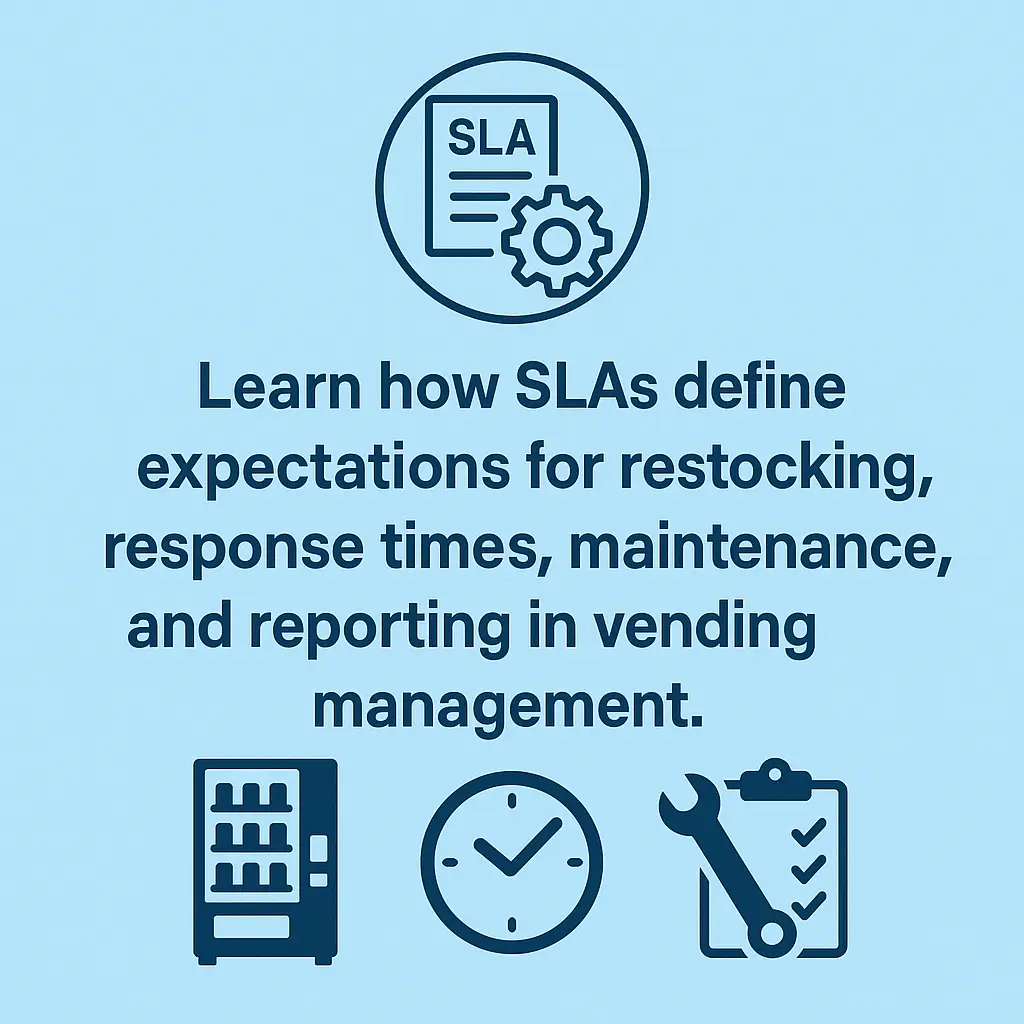Vending Management Service Level Agreements Explained
Learn how SLAs define expectations for restocking, response times, maintenance, and reporting in vending management.
Back to Vending Management Companies ResourcesLearn how SLAs define expectations for restocking, response times, maintenance, and reporting in vending management.
Back to Vending Management Companies ResourcesA comprehensive vending SLA should outline response time guarantees, product restocking frequency, equipment maintenance terms, and reporting standards. This ensures both the business and the vendor are aligned on responsibilities and expectations, minimizing service disruptions and user complaints.
![]() SLAs clarify restocking schedules and inventory variety guidelines
SLAs clarify restocking schedules and inventory variety guidelines
![]() Defined response times reduce downtime for machine repairs
Defined response times reduce downtime for machine repairs
![]() Performance reporting increases vendor accountability and service consistency
Performance reporting increases vendor accountability and service consistency

Vending Management Service Level Agreements (SLAs) play a crucial role in ensuring high-quality service, timely restocking, and minimal disruptions. An SLA is a formal contract between the business owner and the vending provider that outlines the expectations, responsibilities, and response times for various aspects of vending operations.
For restocking, SLAs typically define how often machines should be refilled and what product variety should be included. This helps avoid situations where popular snacks, drinks, or healthy options are constantly out of stock. The SLA may specify different schedules for high-traffic areas versus low-use locations, helping vendors allocate resources more efficiently.
Response time guarantees are another critical component. If a machine malfunctions or runs out of products, the SLA should define how quickly the vendor will respond—often within 24-48 hours. This reduces frustration for end-users and improves overall satisfaction. Poor response times can directly affect morale in office break rooms, schools, or apartment complexes.
Maintenance standards also belong in a well-structured SLA. These include routine checks, preventive servicing, and timely repairs for any reported issues. Without clear commitments, businesses may find themselves dealing with broken machines for weeks. Including a maintenance clause ensures uptime and builds confidence in the vendor relationship.
Finally, SLAs commonly include reporting metrics. These can cover restocking frequency, uptime performance, repair turnaround, and service calls. Transparency into these areas allows businesses to evaluate their vendor objectively and request changes if service quality slips.
A solid SLA builds mutual accountability and raises service standards—something increasingly important for businesses using smart vending solutions or trying to introduce healthier product choices. It also ensures expectations are clear if vending is part of a technology-driven breakroom upgrade.
If you're exploring vending options for your business, Vending Exchange can help simplify the process. Delivery, Installation and Equipment is provided at no cost to you - vendors provide the machines, keep them stocked, and handle all servicing. Whether you need a provider or full-service management, just fill out the form on this page to get started.
An SLA is a contract that outlines the vending provider’s responsibilities, such as restocking frequency, repair response times, maintenance, and reporting requirements.
An SLA sets clear expectations between the business and vendor, helping to eliminate confusion and ensure service issues are promptly handled.
It depends on traffic volume, but SLAs often define restocking at least once a week or more for high-use locations.
Businesses can hold vendors accountable through performance reviews or request service changes backed by the contract terms.
Yes, many SLAs outline expectations for product diversity, including healthy snacks or popular items in demand.
Absolutely. SLAs typically define maximum response windows for equipment issues to ensure timely repairs and minimize downtime.
Not always. Some vendors offer informal service, but professional providers usually agree to written SLAs for transparency and reliability.
Yes, reports on stocking history, service calls, and machine usage are often included in well-structured SLAs.
Businesses with employee breakrooms, apartment amenities, or schools benefit from better service consistency and fewer complaints.
Yes, SLAs can be tailored based on usage patterns, machine locations, or preferences for certain products or tech features.